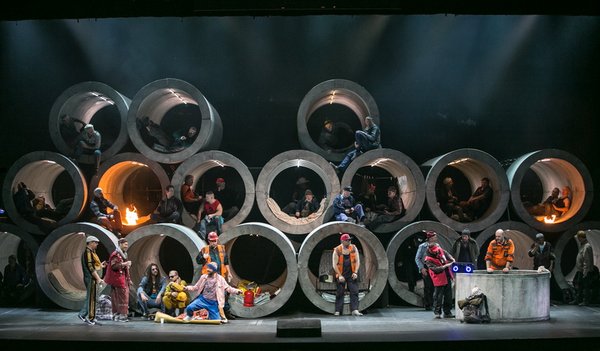
LA FANCIULLA DEL WEST (THE GIRL OF THE GOLDEN WEST)
24 April 2025, 6 p.m.
In Brief
Opera in three acts, in Italian, with Hungarian, English, and Italian subtitles
Details
- Location
- Hungarian State Opera
- Date
- April 24, 2025
- Start time
- 6 p.m.
- End time
- 10 p.m.
Synopsis
Act 1
The gold miners gather in the Polka after a long day. Nick is taking care of business until Minnie arrives, who all the men are in love with. Jack Rance, the sheriff, is also here, then Agent Ashby arrives, who is looking for the bandit, Ramerrez. An argument breaks out between Rance and one of the gold miners: both of them are sure that Minnie will be their wife. The object of their desire arrives just in time to settle things. She gives the men a lesson from the Bible.
Ashby receives a message from an unknown Spanish woman who promises to lead him to the hiding spot of the bandit. Another customer arrives at the saloon: Dick Johnson from Sacramento. Minnie tells them that she knows him, so the gold miners welcome him friendlily. One member of Ramerrez’s gang is caught, so we find out what the others do not: Johnson himself is actually the head of the gang, and his original goal was to raid the gold miners. When Minnie and Johnson are left alone, the woman reveals that she is still waiting for her first true love. Johnson reassures her that as long as he is around, neither Minnie, nor the gold are in danger. The woman invites the man for dinner to her house, and he accepts.
Act 2
Wowkle, the Indian woman is nursing her child in Minnie’s lonely mountain cabin. Minnie enters and starts to get ready: she is expecting Johnson for dinner. After his arrival, they are left alone and confess their love for each other passionately. Johnson, struggling with his conscience, is about to leave, when three gunshots can be heard, so the man hides in the house. The sheriff arrives with three gold miners to let Minnie know: Johnson is no other than Ramerrez, the hunted bandit. The woman tells them to leave, then he chases Johnson away too, who is asserting his love. As the man walks out the door, a shot is fired, and Johnson/Ramerrez stumbles through the door, injured. Minnie hides her lover, but when the sheriff comes back, the blood drops give away the presence of the bandit. Johnson surrenders, but Minnie suggests that they decide the fate of the man over a poker game. If the sheriff defeats her, she will give herself to him; if he loses, Johnson goes free. The woman in love cheats and wins the game. Rance keeps his word and leaves.
Act 3
Rance, Nick, and Ashby are waiting for the group of gold miners, to find out if they managed to catch Ramerrez. The group arrives, and it turns out that they tracked down the bandit, and they continue chasing him with Ashby. Soon, they bring the captive with them, handcuffed, to hang him. All he asks them is not to tell Minnie how his life ends. She should believe that he is living far away and free. Rance frantically urges the execution, but the gold miners hesitate. Minnie arrives in time to help her lover: she threatens that she will first shoot the robber, then herself if they don’t let them free. She reminds the men of all the good things they have her to thank for. The men are moved and have mercy on Johnson, who leaves the Sierra with Minnie to start a decent new life together.
Gallery
Reviews
“I’ve always felt that what kills this work is having paunchy Caruso-type Western characters with big moustaches and revolvers at their sides being forced to sing, ‘Hello, hello, buona sera, ragazzi.’ (…) This time, however, there is no need to believe this. And what remains is the regular opera set-up: the soprano and tenor are in love with each other, but then along comes the baritone.”
Miklós Fáy, Élet és Irodalom
